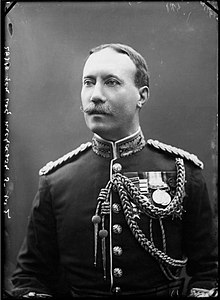William Nicholson, 1st Baron Nicholson
William Gustavus Nicholson, 1st Baron Nicholson GCB (born March 2, 1845 in Roundhay Park , Leeds , † September 13, 1918 in London ) was a British field marshal and chief of the Imperial General Staff . He took part in numerous colonial campaigns in Victorian Great Britain , u. a. in British India , Egypt and Southern Africa .
Life
William Nicholson entered the Woolwich Military Academy in 1863 and subsequently became a lieutenant in the Royal Engineers . From 1868 to 1871 he served in Barbados and then in India, where he was entrusted with various engineering projects. Later he took part in several campaigns , mostly as an adjutant . He was involved in various skirmishes and battles as a captain and engineer officer in the Second Afghan-British War , where he repeatedly distinguished himself.
In 1882 he took part with troops of the British Indian Army in the Anglo-Egyptian War to suppress the Urabi movement . Here, too, he received several awards. Three years later he distinguished himself, meanwhile promoted to lieutenant colonel, in the Third British-Burmese War from again.
Nicholson was appointed military secretary to Lord Roberts , the British Commander-in-Chief in India , on July 1, 1890 , and was given the rank of Colonel on January 1, 1891 . He was employed as chief engineer in the Indian military department from 1893 and was appointed adjutant general for the Punjab with the rank of brigadier general in 1895 . Nicholson served as chief of staff for the Tirah Campaign on India's North West Frontier from 1897 to 1898 . He was appointed adjutant general in India on February 24, 1899.
In the Second Boer War in South Africa Nicholson was again military secretary to the Commander in Chief Lord Roberts. He took part in various battles. However, he was primarily responsible for mobilization and military intelligence . 1904–1905 Nicholson was a military attaché in Manchuria . He was then promoted to General and Quartermaster General in the British Army .
In 1908 Nicholson was appointed Chief of the General Staff and was awarded the Grand Cross of the Bath Order. The position of chief of staff was converted in 1908, so that he led from 1908-1912 the title of Chief of the Imperial General Staff . Since there was no longer a commander-in-chief of the British Army after the departure of Lord Roberts , Nicholson was the military head of the Army of the British Empire . In 1911 he was promoted to field marshal . After retiring from active service, Nicholson was raised to hereditary nobility on October 4, 1912 as Baron Nicholson , of Roundhay in the County of York, and thus received a seat in the House of Lords .
With the beginning of the First World War he was reactivated for the Committee of Imperial Defense . From 1916 he worked in the Dardanelles Commission , which dealt with the catastrophic battle of Gallipoli . He died childless shortly before the end of the war, so that the title awarded to him expired.
Nicholson's career is noteworthy in that he has managed to rise to the highest military rank without ever having held active command.
literature
- TR Moreman: Nicholson, William Gustavus, Baron Nicholson. In: Oxford Dictionary of National Biography . Oxford University Press, 2004 ( https://doi.org/10.1093/ref:odnb/35232 ).
| predecessor | Office | successor |
|---|---|---|
| Office newly created |
Chief of the Imperial General Staff 1908–1912 |
John French |
| New title created |
Baron Nicholson 1912-1918 |
Title expired |
| personal data | |
|---|---|
| SURNAME | Nicholson, William, 1st Baron Nicholson |
| ALTERNATIVE NAMES | Nicholson, William Gustavus Nicholson 1st Baron (full name) |
| BRIEF DESCRIPTION | British Field Marshal and Chief of the Imperial General Staff |
| DATE OF BIRTH | March 2, 1845 |
| PLACE OF BIRTH | Roundhay Park, Leeds |
| DATE OF DEATH | September 13, 1918 |
| Place of death | London |

